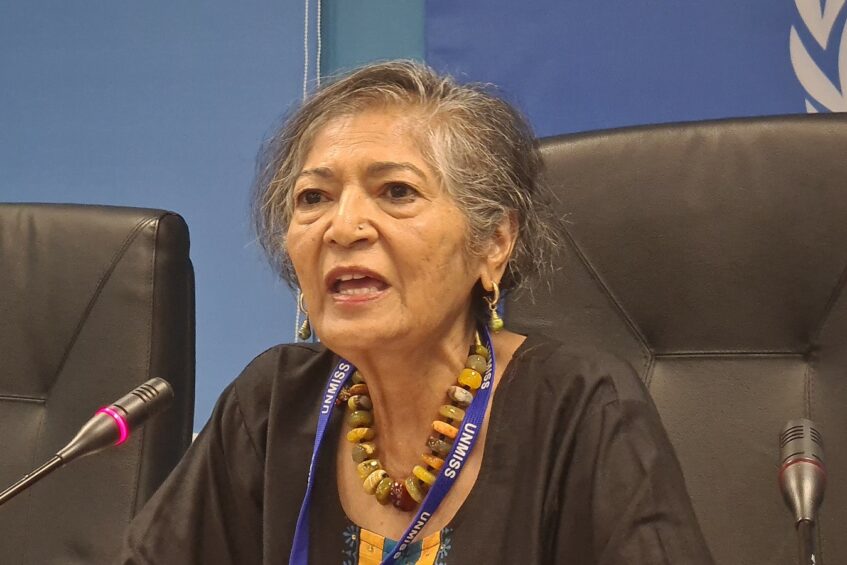
Yasmin Sooka, chairperson of the UN Commission on Human Rights in South Sudan speaking during a joint press conference in Juba on Friday, 16th Feb 2024. Photo Credit: Charles Wote/Eye Radio
UN human rights body says widespread violence with impunity in South Sudan threatens the prospects of durable peace and human rights protections, but the government described the report as ridiculous and unverified.
The UN Commission on Human Rights in South Sudan cited deeply rooted repression of political and media freedom, in its latest report presented to the UN Human Rights Council in Geneva.
However, in a joint press conference held on Wednesday, the ministries of Justice and Foreign Affairs refuted the findings of the UN Commission’s report.
Amb. Anthony Kon, Director General of Multilateral Relations at the Ministry of Foreign Affairs, and Counsel Lawrence Loro Kamilo from the Ministry of Justice and Constitutional Affairs on Wednesday, February 27, 2024, dismissed the report as ridiculous and unverified.
The government officials also called for the removal of certain paragraphs and provisions in the report.
They said the report should be adjusted in the best interest of the government and the people of South Sudan.
According to the statement published by the foreign ministry, Ambassador Kon stated that the report was baseless and undermined the progress made in addressing political conflicts within the country.
“The government has the following observations on the report paragraph contains an upset and verify unrealistic allegations of human rights violations and abuses political repressions economic radiation discrimination of women inequality section violence sexual slavery and displacement of millions,” Ambassador Kon said.
“The description of events cannot match the current Improvement of the security situation and the country is unproven and concocted situations. Do not reflect the current situation,” he said.
However, the UNCHR Chairperson Yasmin Sooka, said their investigation has found violations of human rights perpetrated on communities and families by armed forces and militia groups.
“Our investigations again found an unacceptable situation in South Sudan, whereby families and communities are devastated by human rights violations and abuses by armed forces, militias and state institutions acting with impunity,” said Sooka.
She said the media and civil society groups operate under intolerable conditions which stifle democratic space for the population at large.
“The drivers of violence and repression are well known, and while commitments have been made to address them, we continue to see a lack of political will to implement the measures necessary to improve millions of lives.”
“South Sudan’s immediate and long-term future hinges on political leaders finally making good on their commitments to bring peace, and reverse cyclical human rights violations.”
The report draws on a year-long investigations undertaken in South Sudan and the region, involving hundreds of witness interviews and meetings, expert open source and forensic analysis, and dozens of engagements with state authorities.
The findings, UNCHR said, detail the persistence of armed conflict, whereby State actors have either instigated or failed to prevent or punish violence, which frequently involves killings, sexual and gender-based crimes, and the displacement of civilian populations.
“The Commission also identifies the use of children in armed forces, the State’s systemic curtailment of media and civil society actors both in and outside of the country, and the diversion of available State revenues from rule of law, health, and education institutions,” the report reads, in part.
“The transformative promises of the Revitalized Agreement remain unfulfilled, jeopardizing prospects for peace and human rights protections,” said one of the two UNCHR Commissioners, Barney Afako.
“The process of merging forces is not yet completed, the drafting of a permanent constitution has not started, and none of the three transitional justice institutions are established.”
“Time is running out for South Sudan’s leaders to implement key commitments, which are the building blocks for peace, for holding the country together, and advancing human rights beyond the elections.”
The report finds that patterns of violations remain unchanged, ever-increasing because the root causes remain unaddressed.
Abductions of women and children in Jonglei State and the Greater Pibor Administrative Area appear to be worsening in scale and severity, frequently involving horrific sexual violence and the separation of parents from children, it noted.
The Commission further alleged that authorities paid ransoms to captors in exchange for the release of abductees in Jonglei State in 2023, which risks incentivizing the recurrence of crimes.
Many women and children are still missing; other abductees are held hostage as authorities fail to effectively intervene. The perpetrators of abductions previously documented by the Commission had not been punished.
“The persistent failure to build a justice system implicates the state in these violations,” said Commissioner Carlos Castresana Fernández.
“There is no protective institution between the people and criminals, and it is no coincidence that areas most affected by abductions and other gross violations have few courts and judges, if any. Developing a functioning judiciary is an inter-generational project that must urgently start in earnest.”
The report is accompanied by a detailed paper published by the Commission on 5 October 2023, examining in detail the persistence of attacks against journalists and human rights defenders, and pervasive regimes of media censorship and arbitrary restrictions on civic activities, which systemically curtail the democratic and civic space.
UNCHR recommends that the Government of South Sudan focuses on addressing structural drivers of violence, which require urgently implementing core aspects of the Revitalized Agreement.
This include establishing transitional justice institutions, as well as identifying required actions to open democratic space, and enable political processes to be meaningful and legitimate.
Chairperson Yasmin Sooka’s statement to the Council focused on the stories of South Sudanese interviewed by the Commission, whose lives remain blighted by the persistence of conflict, and who call on the country’s leaders to finally embrace peace.
Support Eye Radio, the first independent radio broadcaster of news, information & entertainment in South Sudan.
Make a monthly or a one off contribution.
Copyright 2024. All rights reserved. Eye Radio is a product of Eye Media Limited.